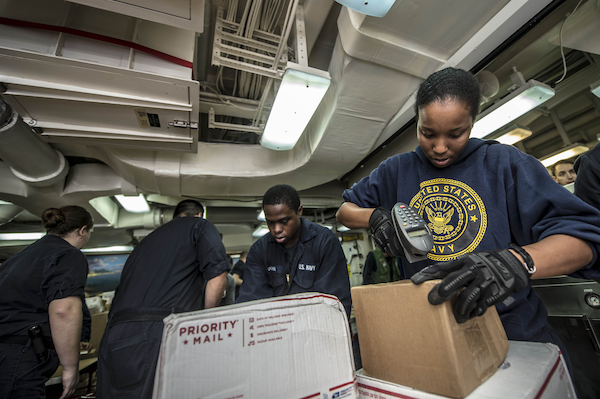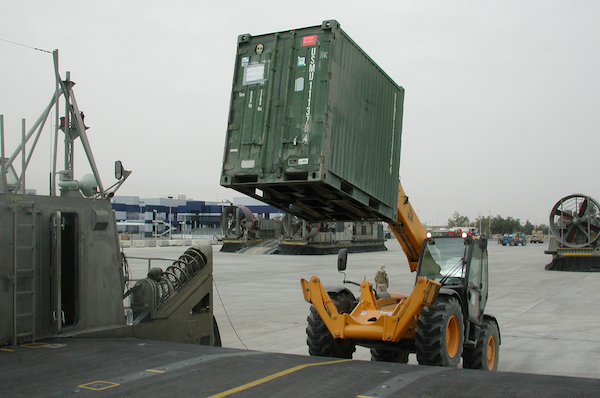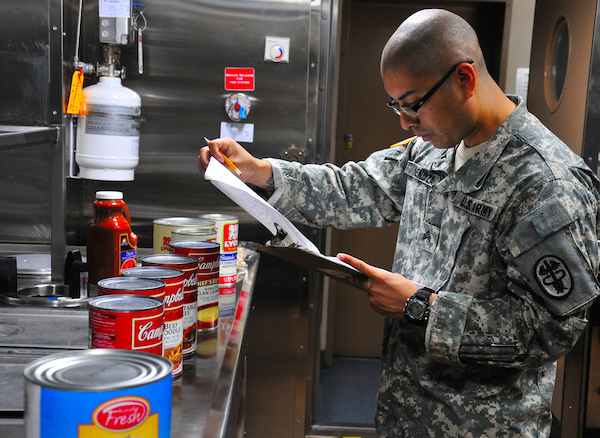Logistics Specialists supply the Naval Warfighter.
LSs are a key component for all Navy operations, providing the parts and materials necessary to complete vital maritime missions around the world.
These Sailors are responsible for supplying everything from ketchup to radios, and televisions to toilet paper.
Without a Logistics Specialist, a mission will be over before it ever begins.

Jump To A Section
Who Can Be a Logistics Specialist?
A Logistics Specialist is responsible for fulfilling the logistical needs of the command’s mission.
This can involve ordering parts, working in the mail office, or managing inventory.
The following is a list of basic requirements for all candidates to the Logistics Specialist rating:
- Must have a high school diploma or equivalent
- Must have a combined ASVAB line score of VE + AR = 96
- A U.S. citizenship is not required, but must be eligible to work in the United States
- Must have a clean criminal record, with the exception of minor offenses
Logistics Specialist Training and Qualifications
Boot Camp
The first step in your Logistics Specialist training is going to be attending Recruit Training, more commonly referred to as boot camp. Navy Recruit Training takes place at Recruit Training Command Great Lakes in Great Lakes, Illinois.
Here Recruit Division Commanders (RDCs) will teach you the basic military skills and knowledge necessary to begin work in the United States Navy.
While at RTC Great Lakes, you will also learn basic Navy ship handling, small arms usage, firefighting, and Naval heritage.
Barring any unforeseen circumstances, this training normally lasts about 8 weeks.
Related Article – Navy Jobs List: A List Of All 71 Ratings In The US Navy For 2019
LS “A” School
Once you graduate from Recruit Training, you will report to Naval Air Station Meridian in Meridian, Mississippi, where you will attend Logistics Specialist Accession training, also known as LS “A” School, for nine weeks.
While attending LS “A” School at Naval Technical Training Center Meridian, you will receive training surface and aviation supply and postal services.
By the time you graduate LS “A” School, you will have received basic training in:
- Applying sound customer service skills
- Warehouse storage and layout techniques
- Naval Supply System financial management
- Identifying material needs
- Utilizing the Navy Supply catalog system
- Using military standard requisition and issue procedures
- Employing all official correspondence relating to the supply system
- Requisition follow-up and receipt procedures
After graduating LS “A” School, you will be officially designated a Navy Logistics Specialist, and receive orders to your first command.
Life as a Logistics Specialist
Daily Supply Duties
As a Logistics Specialist, you will generally serve your first tour on a Navy ship.
Your daily duties on a ship may include ordering, stocking, and issuing repair parts for Navy equipment.
You might be responsible for keeping an inventory of clothing and general supplies.
You may be charged with maintaining financial records, accounting systems, and inventory databases.
You will almost always be part of tracking material stocked in shore-based warehouses and ship storerooms.
Hazardous Material (HAZMAT)
You may perform duties associated with hazardous material (HAZMAT) control and management.
This includes organizing and maintaining databases, correspondence files, and reports related to the hazardous material program.
Another duty you could be assigned would be retaining logistic and financial publications relevant to your command’s logistics division.

Postal Services
Logistics Specialists are also responsible for managing and operating Navy post offices.
Here, you would sort and distribute all kinds of mail and parcel postage, as well as process and dispatch mail.
You would also perform counter operations such as selling stamps, handling money orders, and preparing and maintaining postal records.
These duties will be conducted within the same regulations as those followed by the United States Postal Service offices.
Outside the Office
When not working in the supply department, you will be standing operationally vital security watches.
You may be armed up with small arms weapons, manning a .50 caliber machine gun, using long-distance viewing equipment to watch for enemy contacts, or just checking identification on the ship’s quarterdeck.
Even outside the office, Logistics Specialists play a vital role in the command’s mission.
Shore Duty
Following the tour onboard your first ship, you will receive orders to either a Navy shore facility, or a squadron.
In these situations, you will often serve as the sole logistics point of contact for your command.
This puts you in a position of vital importance when it comes to ensuring available resources meet operational needs.

Sea/Shore Rotation
In the Navy, you will swap between deployable “sea” duties, and generally non-deployable “shore” duties.
There are situations where these rotations can change, but as a general rule the Navy will do everything in its power to ensure all Sailors are able to meet their proper sea/shore rotations.
The sea to shore assignment rotation for Logistics Specialists is as follows:
- First sea tour will be 55 months
- First shore tour will be 36 months
- Second sea tour will be 42 months
- Second shore tour will be 36 months
- Third sea tour will be 36 months
- Third shore tour will be 36 months
- Fourth sea tour will be 48 months
- Fourth shore tour will be 36 months
Pay and Compensation
Your pay is going to be based on a combination of your rank and time in service.
Related Article: Navy Enlisted And Officer Ranks And Pay
LSs will generally be the paygrade of E-3 with right at a year of service once they become rated.
This means your starting base yearly salary could be roughly $23,774 as an E-3 with fewer than two years and max out at $89,698 as an E-9 with 30 years of service.
This of course does not include Basic Allowance for Housing (BAH), or Basic Allowance for Subsistence (BAS).
LSs will be entitled to Sea Pay while they are attached to a Navy ship.
This amount is based on your rank and amount of time you have at sea.
The amount can range from $50 a month as an E-3 and below with less than a year at sea, to $750 a month as an E-9 with eight or more years at sea.
Again, this does not factor in your BAH, or BAS allowances.
BAH alone can range from $7,452 to $62,748 a year depending on your rank, marital status, and where you live.
Click Here to check out our BAH calculator, which will tell you exactly how much you’ll get based on your rank and location.
Although it fluctuates semi-annually, Logistics Specialists typically tend to have a lower advancement opportunity than the Navy average.
This means your advancement as a Logistics Specialist may be more competitive than other Navy ratings.
Civilian Opportunities
Logistics Specialists gain some of the most transferable training and experience out of any Navy rating.
LSs have access to more certifications than any other rating, because of the importance of logistics in the business world.
Many of the Navy logistics concepts are designed to mimic those of major Fortune 500 companies, making the experience easily transferable.
The following are some of the post-Navy career opportunities Navy Logistics Specialists can find themselves seeking:
- Accountants
- Administrative Services Managers
- Budget Analysts
- Office Managers
- Logisticians
- Logistics Managers
- Postal Service Clerks
- Postmasters
- Procurement Clerks
- Purchasing Agents
- Transportation Managers
- Financial Managers
- Hazardous Material Technicians
Through the Navy Credentialing Opportunities On-Line (COOL) program, Logistics Specialists have the ability to earn credentials they can use in the civilian world.
For free, they may earn certifications as:
- Certified Associate in Project Management (CAPM)
- Certified in Logistics, Transportation and Distribution (CLTD)
- Certified in Production and Inventory Management (CPIM)
- Certified Logistics Technician (CLT (AE))
- Certified Mail Manager (CMM)
- Certified Professional Public Buyer (CPPB)
Additionally, Logistics Specialists can earn designations from the Department of Labor through the United States Military Apprenticeship Program (USMAP) as a certified apprentice in the following fields:
- Manager, Retail Store
- Office Manager/Administrative Services
- Post-Office Clerk
On top of all that, there is Active Duty Tuition Assistance and the GI Bill.
Tuition Assistance will pay up to $250 a credit, for 12 credits a year, and a total of 120 credits over a lifetime.
The Post 9/11 GI Bill provides 36 months of tuition, an annual book stipend, and Basic Allowance for Housing.
Related Article: 17 Scholarships For Military Children, Spouses, and Veterans
Because of their professional training, Logistics Specialists are awarded semester credit hours in the following areas:
- Office machines
- General clerical procedures
- Basic accounting principles

What Is It Like to Be A Logistics Specialist?
Logistics Specialists fill an important role in the overall Navy mission.
Without the skills and expertise provided by the Navy’s Logistics Specialists, the Navy would never have been able to achieve the many great accomplishments throughout its great history.
With the vital responsibility of ensuring that the warfighter has the resources necessary to complete the mission, LSs are a necessity at any command, anywhere.
Because of this necessity, Logistics Specialists can be stationed anywhere in the world, on any type of duty assignment.
If you like the idea of managing mission vital resources in times of vital operational need, then a career as a Logistics Specialist might be the opportunity for you!
References
Navy LS, Supply, And Purchasing Jobs
- Navy Promotion Timeline for Enlisted & Officers - June 19, 2024
- Navy SEAL Training (BUD/S) - June 19, 2024
- Navy Aircraft Carrier Flight Deck Shirt Colors Explained - June 19, 2024
